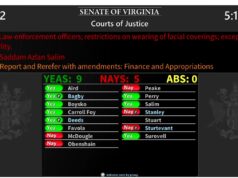From Del. Paul Krizek (D-Fairfax)
Governor Sets New Veto Record
Governor Youngkin has acted on a total of 482 bills passed by the General Assembly ahead of his fast-approaching April 8th deadline. To date, the Governor has vetoed 91 bills, the most of any Governor in the history of the Commonwealth in just a single year. Remarkably, he has issued 132 total vetoes during his 3-year term in office, breaking a record set by former Governor McAuliffe. And, that number is sure to grow as there are 600 more bills yet to be acted upon. Given the narrow party-line passage of many of these bills, this result wasn’t surprising. Nevertheless, it highlights the Governor’s disconnect from the concerns of average Virginia families.
As you know from reading this weekly column, my bill HB 1167, which would have authorized any locality to adopt an ordinance to prohibit the sale of English Ivy (Hedera helix) within its jurisdiction was vetoed last month. An invasive plant, English Ivy is a major killer of trees in Virginia and costs landowners and local governments millions to eradicate. On Tuesday, the Governor vetoed two more bills that would have required signage posted at retailers that sell invasive plants to educate consumers about invasive plant species and encourage consumers to ask about alternatives. In his veto of my bill, the Governor stated that the most effective approach to addressing the issue of invasive plants in the Commonwealth is education. However, these most recent vetoes contradict that.
The Governor’s veto of our joint legislation with Senator Rouse, aimed at establishing a robust regulatory framework for an adult-use only retail cannabis market, represents a huge failure. This veto not only squanders a crucial opportunity to protect Virginians but also intensifies the proliferation of dangerous illicit products, amplifying risks to our schools and public safety. Virginia’s illicit cannabis market soared to a staggering $2.4 billion in 2023, underscoring the urgency of enacting effective measures. (You can find my full statements on the vetoes of legislation I introduced on my website www.paulkrizek.com.)
Also on the chopping block was one of our top Democratic priorities this session: raising the minimum wage. HB 1 and SB 1 would have increased the current $12 an hour minimum wage to $13.50 on January 1, 2025, and then to $15 on January 1, 2026. HB 157 would have removed the farmworker exemption from the Virginia Minimum Wage Act, righting a historic wrong by extending long-overdue minimum wage protections to Virginia’s farmworkers and migrant workers on temporary visas. Additionally, the Governor vetoed legislation that would have required employers to list pay ranges on job postings and stop relying on job applicants’ prior salary to set wages. The Governor passed up a rare opportunity to stand up for equal pay and wage transparency, which would have been a win-win for employers and workers.
The Governor vetoed Senator VanValkenburg’s SB 606, cognate to Delegate Sickles’ HB 1177, directing the Commonwealth to re-enter the Electronic Registration Information Center (ERIC). ERIC is a multi-state partnership that experts across the political spectrum consider the only reliable, secure way for states to share voter data and information with each other and serves as an essential tool for election officials to prevent people from being registered to vote in multiple states. Virginia was a founding member of ERIC in 2012.
The Governor vetoed 30 bills related to firearm safety and gun violence prevention. One bill would have criminalized possession of firearms in public university buildings, allowing law enforcement to make arrests, seize weapons, and open criminal investigations. This measure was supported by university police chiefs in the Commonwealth as a tool to combat campus gun violence. While public universities can have policies prohibiting guns on campus, the only available remedies for violating those are administrative ones like suspension or expulsion. HB 2 and SB 2 would have banned the sale, purchase, manufacture, transport, or transfer of assault firearms. The bill defines an assault firearm as a semi-automatic rifle or pistol with a fixed magazine capacity of over 10 rounds or the ability to accept a detachable magazine. Another bill vetoed would have made it illegal to leave a firearm visible in an unattended motor vehicle. The Governor also vetoed two bills that would have protected individuals experiencing a mental health emergency from prosecution during police encounters.
Unfortunately, the likelihood of overriding these vetoes during the Reconvene session in Richmond on April 17th is minimal, as it necessitates a two-thirds majority vote to override a veto. However, the Governor has amended several bills and still has others to address. These amendments only require a majority vote for rejection or approval. If rejected, the Governor will then have the final chance to either veto or sign the legislation.


![[UPDATED 1/29/26] Audio: Sen. Tim Kaine Talks to Blue Virginia About His “Five-Point Plan” to Fight Trump’s Orban-Like Assault on US Democracy; Civil Disobedience a la MLK Jr.; Trump’s Bogus “Energy Emergency”; the Crucial Importance of the 2025 VA Elections; etc.](https://bluevirginia.us/wp-content/uploads/2025/02/kaineinterview2-238x178.jpg)

![CNU Wason Center Poll of Virginia: Trump Approval at Just 34%; “narrow majority support a constitutional [redistricting] amendment”](https://bluevirginia.us/wp-content/uploads/2026/01/wason0128-1-238x178.jpg)





![[UPDATED 1/29/26] Audio: Sen. Tim Kaine Talks to Blue Virginia About His “Five-Point Plan” to Fight Trump’s Orban-Like Assault on US Democracy; Civil Disobedience a la MLK Jr.; Trump’s Bogus “Energy Emergency”; the Crucial Importance of the 2025 VA Elections; etc.](https://bluevirginia.us/wp-content/uploads/2025/02/kaineinterview2-100x75.jpg)
